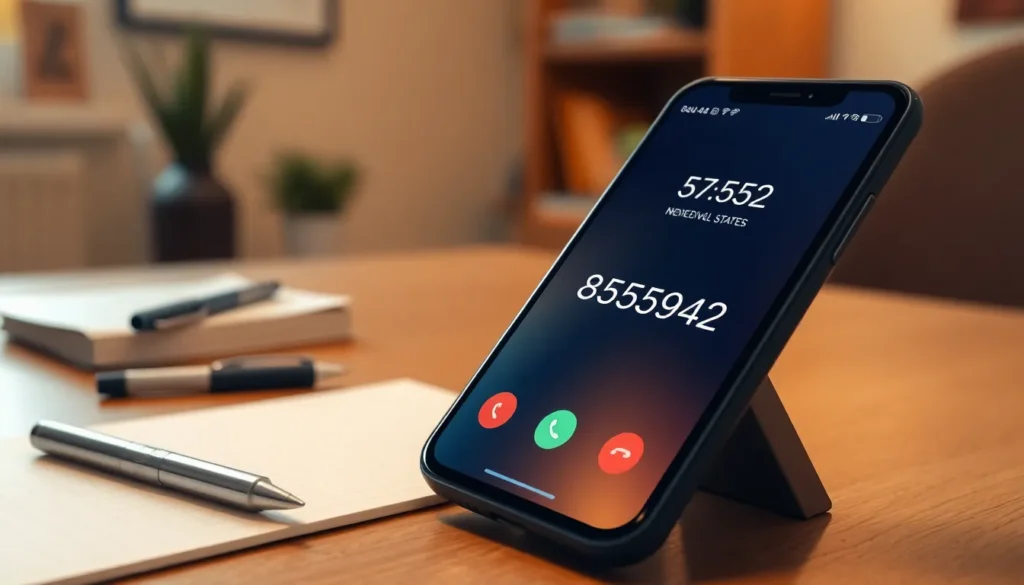Table of Contents
ToggleIn a world where everyone seems to have a personal trainer in their pocket, mobile health apps are the unsung heroes of wellness. These handy digital companions are revolutionizing how people track fitness, manage stress, and even monitor chronic conditions—without the need for a medical degree or a gym membership. Who knew that getting fit could be as easy as tapping a screen while lounging on the couch?
Overview of Mobile Health Apps
Mobile health apps, or mHealth apps, represent a significant shift in healthcare delivery and personal wellness management. These applications offer users tools for fitness tracking, dietary management, mental health support, and chronic disease monitoring. Individuals access a range of features such as step counters, calorie trackers, and meditation guides, enhancing their ability to maintain healthy lifestyles.
Data from the Pew Research Center indicates that approximately 70% of smartphone users have at least one health-related app installed. This statistic showcases the widespread adoption of mobile health technologies across various demographics. Users often engage with these apps due to their accessibility and the convenience of managing health information anytime, anywhere.
Many mobile health apps provide personalized insights based on user input. For instance, unique algorithms analyze data like physical activity levels and nutritional habits, offering tailored recommendations. These custom-tailored suggestions can boost motivation and adherence to health goals.
Professional organizations increasingly endorse mobile health apps for chronic disease management. The American Diabetes Association supports specific apps designed for blood glucose monitoring and insulin management. These applications help patients maintain better control over their conditions, significantly improving health outcomes.
Regulatory scrutiny of mobile health apps is growing. The FDA has begun evaluating certain applications, ensuring that they meet safety and efficacy standards. This regulatory oversight enhances confidence among users, indicating the commitment to safeguarding public health.
Mobile health apps are transforming personal healthcare by offering tailored solutions. Their widespread use and growing endorsement emphasize the evolution of wellness management in the digital age.
Benefits of Mobile Health Apps

Mobile health apps offer numerous advantages, enhancing healthcare access and patient involvement in their own wellness journeys. These digital tools significantly impact personal health management.
Improved Access to Healthcare
Mobile health apps facilitate greater access to healthcare resources. Users can connect with healthcare providers remotely, reducing the need for in-person appointments. Many apps also provide educational materials, enabling individuals to better understand their health conditions. Statistics show that approximately 70% of smartphone users have at least one health-related app, highlighting the widespread availability of these resources. The convenience provided by mobile apps empowers users to make informed health decisions anytime, anywhere.
Enhanced Patient Engagement
Engaging patients in their health management becomes easier with mobile health apps. Many applications offer personalized feedback based on user input, driving motivation and adherence to health goals. Users can set reminders for medications and appointments, helping them stay organized. By fostering a connection between patients and their health data, these apps encourage proactive health management. Research indicates that increased patient engagement results in better health outcomes, making mobile health apps an essential part of modern healthcare strategies.
Popular Types of Mobile Health Apps
Various types of mobile health apps cater to distinct user needs, enhancing overall wellness and healthcare management. Here are a few notable categories.
Fitness Tracking Apps
Fitness tracking apps serve as essential tools for monitoring physical activity. These applications enable users to track steps, workouts, and calories burned. Many feature integration with wearables, enhancing accuracy and user experience. Users often benefit from guided exercises and personalized fitness plans tailored to their individual goals. Statistics indicate that 23% of smartphone users utilize fitness tracking apps regularly. Popular options include MyFitnessPal and Strava, well-regarded for their community support and goal-setting features.
Medication Management Apps
Medication management apps play a crucial role in helping users adhere to prescribed regimens. These apps remind users to take medications on schedule, reducing the risk of missed doses. Features often include refill alerts and education on medication side effects. Approximately 50% of patients report struggling with medication adherence; these apps can significantly improve consistency. Some well-known examples, like Medisafe and CareZone, offer additional features such as medication logs and health history tracking, promoting informed healthcare decisions.
Challenges and Considerations
Mobile health apps face significant challenges that can impact their effectiveness and user trust. These challenges include data privacy, user adoption, and overall engagement.
Data Privacy Concerns
Data privacy remains a critical issue for mobile health apps. Sensitive user information, such as health data and personal details, often requires robust protection. Recent reports show that security breaches can lead to a loss of trust, making some individuals hesitant to use these apps. According to a survey by McKinsey, 60% of users expressed concerns over how their data is handled. Transparency in data collection practices is essential. Developers must ensure compliance with regulations like HIPAA to safeguard user information. Maintaining user trust hinges on a strong commitment to data security.
User Adoption Barriers
Various factors hinder user adoption of mobile health apps. Complexity in navigation can frustrate users, leading to decreased engagement. A study by Pew Research Center revealed that 40% of users abandoned apps due to difficulties in use. Additionally, lack of awareness about app features contributes to limited adoption. Users often seek effective solutions that align with their health goals, and if apps fail to deliver clear value, they might not persist. Education and user-friendly designs are crucial for overcoming these barriers, fostering a more significant user base for mobile health applications.
Future Trends in Mobile Health Apps
Mobile health apps are set to evolve rapidly, adapting to technological advancements and user expectations. Integration of artificial intelligence offers personalized health recommendations and predictive analytics. Users can expect smart algorithms that analyze their habits, providing tailored insights and suggestions for improved health management.
Wearable health technology is increasingly linked with mobile applications, enhancing user experiences. Devices like fitness trackers and smartwatches send real-time data to apps, allowing users to monitor vital statistics seamlessly. This integration facilitates more comprehensive health management, making it easier to track fitness routines and health metrics.
Telehealth features in mobile apps gain prominence, allowing users to connect with healthcare professionals remotely. Enhanced access to virtual consultations supports users in managing health issues without needing in-person visits. Approximately 70% of consumers prefer virtual appointments for convenience and efficiency.
Data security advancements also play a vital role in the future of mobile health apps. Developers are focusing on compliance with privacy laws, like HIPAA, ensuring users feel safe sharing sensitive information. A strong commitment to protecting user data builds trust and encourages wider adoption.
Moreover, gamification techniques become more prevalent within mobile health apps. Added elements of games, like challenges or rewards, motivate users to engage more consistently with their health goals. These strategies cater to users seeking encouraging and interactive experiences.
Finally, social connectivity features are emerging within these applications, allowing users to share progress and support each other. This community engagement fosters motivation and accountability, vital for long-term success in health management. These trends reflect the commitment of mobile health apps to enhance user experiences and health outcomes.
Mobile health apps are reshaping the landscape of personal healthcare by offering accessible and tailored solutions for users. Their ability to promote wellness and enhance patient engagement is undeniable. As technology continues to advance, these apps will likely become even more integrated into daily health management.
With features like AI-driven insights and telehealth capabilities, they’re set to meet evolving user expectations. Addressing challenges like data privacy and usability will be crucial for sustained growth and user trust. The future of mobile health apps looks promising as they pave the way for more informed health decisions and improved health outcomes.




